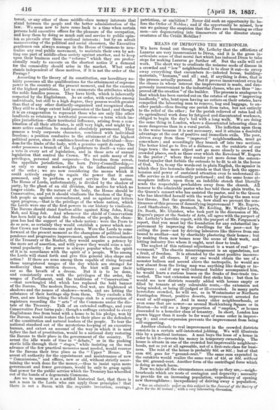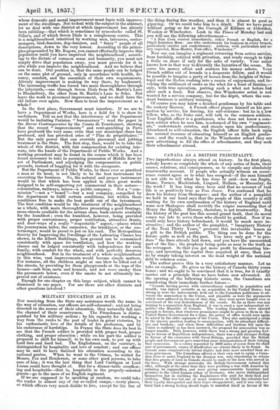MEANS OF IMPROVING THE METROPOLIS.
WE have found out through Mr. Letheby that the afflictions of Lazarus are very inconvenient to Dives, and it is the gross inarticulate sense of that moral fact which has induced Dives to take steps for making Lazarus go further off. But the exile will not work. The short way to eradicate the noisome seeds of disease in a crowded and "low " neighbourhood is to clear it out—to sweep away everything that encumbers it—infected house building
materials, humans," and all ; and, if anything is done, that is the process actually pursued. But it proves inconvenient even for the classes in whose interest the improvement is made, and dangerously inconvenient to the industrial classes, who are thus "improved off the creation" of the builder. The process is analogous to that which has been carried out on the estates of some "improving landlords," who, bent upon having no cotters on their estates, have compelled the labouring man to remove, bag and baggage, to another parish—thus freeing one parish from rates, but not entirely to the relief of the other ; for the parish relieved of rates had all its agricultural work done by fatigued and discontented workmen, obliged to begin the day's toil with a long walk. We are doing the same thing in London, where a discontented labouring class is more dangerous than in a rural parish. The infliction upon them is the worse because it is not necessary, and it attains a doubtful advantage at the cost of positive and immediate evils. The poor, driven away from these "improved" neighbourhoods, must go somewhere ; and accordingly they branch off into two sections. The better kind go to live at a distance, on the outskirts of our huge town : the more abject sort go more closely to crowd the crowded places, such as those over which the Reverend W. Rogers is the pastor ;• where they render yet more dense the concentrated squalor that forbids the outcasts to be fit to sit in the house of God. Yes, to say the words out in plain English, the squalor in which they live benumbs their minds so that they lack the apprehension and power of sustained attention even to understand divffie service as it is ordinarily performed ; and the same home atmosphere inflicts upon them an indelible stench that literally sends the respectable pewholders away from the church. All honour to the admirable pastor who has told these plain truths, to the Queen's consort who has assisted the pastor, and to the Queen who has identified herself with the work by placing the man near her throne. But the question is, how shall we prevent the continuance of this process of damnifying improvement ? Mr. Rogers, Lord Shaftesbury, Mr. Bennoch, Mr. Keeling, Mr. Waller Lewis, Dr. Booth, Mr. (finisher, who took part in the discussion of Mr. ltogers's paper at the Society of Arts, all agree with the purport of Mr. Letheby'e horrible report, with the purport of Mr. Fergusson's report, that you must lay the foundation for any substantial improvement by improving the dwellings for the poor—not by exiling the poor—not by driving labourers like thieves from one bound to another—not by charitably plastering their homes ; but by making them new homes near the scene of their work, and letting industry live where it ought, next door to trade. The neglect of this rational adjustment is a want of real " government. ' The chaotic misarimagement is an opprobrium, not a fruit, of freedom. It is attended by the most positive inconveniences for all classes. If any one would obtain the use of a monster balloon and ascend above the metropolis, he would see how absent from the living map was anything like design or in
telligence; and if any well builder accompanied him, he would learn a curious lesson on the freaks of free-trade travestied. The vast extension would first strike him ; but then he would see new districts recently added with houses empty or filled by tenants at only colourable rents,—the extension not being needed, or being ill-judged or ill-executed. In many parts heretofore crowded, he will see, as in Westminster or Northern Farringdon Street, positive deserts, improvement arrested for want of self-support. And in many older neighbourhoods, or even some that are newer—as around Mecklenburg Square or in. Hoston—he will see a large proportion of "empties,' or houses descended to a homelier class of tenantry. In short, London has grown bigger than it needs be for want of some order in improving it ; and over-expansion prevents the improvement from being self-supporting.
Another obstacle to real improvement in the crowded districts consists in a certain self-interested jobbing. We will illustrate this by a practical instance. A man buys the lease of a house in order to let it—invests his money in temporary ownership. The house is situate in one of the crowded but improveable neighbourhoods, not as yet at all agreeable, not of a first-rate class for business. The rent of the house is probably 851. or 951.; but of that sum 401. goes for "ground-rent." The same sum expended in the outskirts would realize the same rent of 451. or 551. without the 401. ground-rent. Another form of the centrifugal force which is doing so much harm. Now we,take all the circumstances exactly as they are,—neighbourhoods which are nests of contagion and depravity; necessity to provide for an increasing population, expediency of opening new thoroughfares ; inexpediency of driving away a population,
* See an admirable pain.r on this subject lathe .Tournot of the"Society of Arts for the 3d instant ; with a very Interesting discussion.
whose domestic and moral improvement must begin with improvement of the dwellings. Not to deal with the subject in the abstract, let us deal with one district at which improvement has already been nibbling—that which is sometimes by synecdoche called St. Giles's, and of which Seven Dials is a conspicuous centre. This is a neighbourhood inhabited by working men, labourers, costarmongers, bird-fanciers, dog-fanciers, and "fancy" people of all descriptions, down to the very lowest. According to the principles propounded by Mr. Rogers, you cannot effectually improve this population until you have improved the neighbourhood ; according to the dictate of common sense and humanity, you must not simply drive that population away, you must provide for it in situ while you improve the neighbourhood. And we believe that can be done. Our position is, that the same people can be lodged on the same plot of ground, only in accordance with health, decency, comfort, and the essentials of their own requirements. Already improvement is making its way there, by haphazard. The increasing traffic has forced two main thoroughfares through the labyrinth,—one through Seven Dials from St. Martin's Lane to Bloomsbury, the other from St. Martin's Lane to Soho. But leave the work to piecemeal improvement, and we shall have the old failure over again. How then to treat the improvement as a whole?
In the first place, Government must interfere. If we are to have a Department of Works, here is a field for it to show its usefulness. Tell us not that the interference of the Department would be imitating Parisian " bureaucracy " : read the paper in the Rerue Contemporaine by the Comte de Tourdonnet, showing that the recent "improvements" and rent-gambling in Paris have produced the very same evils that our municipal chaos has produced, and has provoked cries of "Plus de proprietaires " But the only power that can override piecemeal and jobbing treatment is the State. The first step, then, would be to take the whole of this district, with fair compensation for existing interests, into the hands of the Department of Public Works. And a working precedent may be found in the course which it has been found necessary to take in assuming possession of Middle Row by act of Parliament, and adjudging the compensation on public grounds, instead of haggling for it with the occupants. But the Department of Public Works, be there ever so practical a man at its head, is not likely to be the best instrument for executing the business. No, the natural and proper instrument would be that which has been applied to other great works designed to be self-supporting yet commercial in their natureeolonziation, railways, mines—a public company. Not a "commission "—not a "board "—but a real company, compelled by the department to fulfil certain conditions, but within those conditions free to make the best profit out of the investment. The first condition would be the treatment of the neighbourhood as a whole, with main thoroughfares presenting a good frontage, oross-streets available for the artisan class, back-streets available for the humblest ; even the humblest, however, being provided with proper conveniences, proper ventilation, attractive fronts, and door-ways of a really " respectable " aspect,—places which the journeyman tailor, the carpenter, the bricklayer, or the costermonger, would be proud to put on his card. The Metropolitan Society for Improving the Dwellings of the Labouring Classes has shown, in the Albert Buildings, how ground can be economized consistently with space for ventilation, and how the workin classes can be lodged consistently with independence for coo family, with comfort for the whole, and with perfectly decorous neighbourhood. But in the treatment of a whole neighbourhood in this wise, vast improvements would become simple matters. For instance, all the children might at one blow be lifted out of the streets, by providing for them playgrounds at the tops of the houses—safe from carts and kennels, and not more smoky than the pavements below, even if the smoke be not ultimately improved out of existence.
Enough for one chapter on this large subject, which cannot be dismissed in one parer. For are there not other districts and other questions involved?



























 Previous page
Previous page